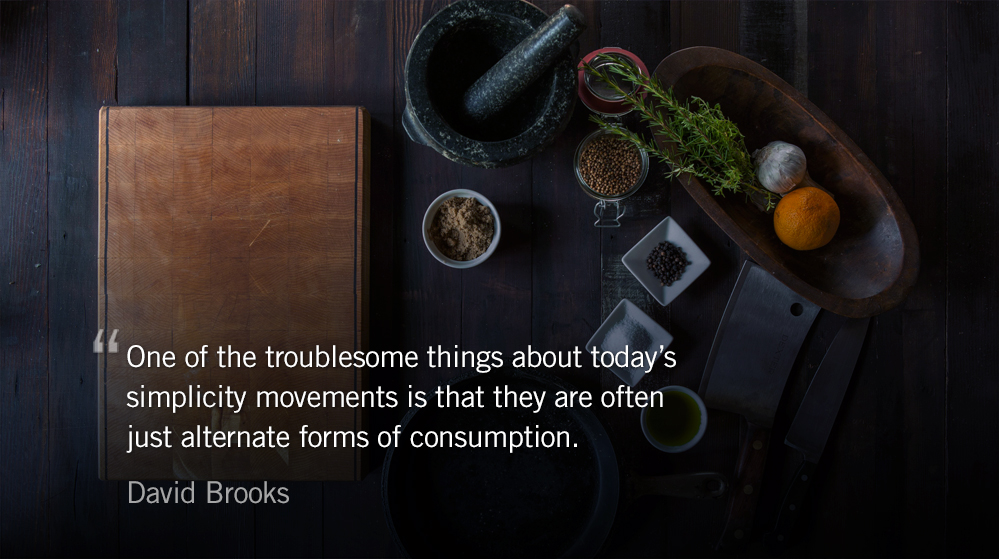“One of the troublesome things about today’s simplicity movements is that they are often just alternate forms of consumption” — David Brooks
The desire to simplify, in-light of rampant materialism, gained traction over the past decade and blossomed into an overwhelming market of goods and services. Blogs, magazines, products, and even consultants have captured the public imagination — largely because most of us feel underwater when it comes to work, family, and personal life.
Magazines like Real Simple are sometimes asking you to strip away your stuff so you can buy new, simpler stuff. There’s a whiff of the haute bourgeoisie ethos here — that simplification is not really spiritual or antimaterialism; just a more refined, organic, locally grown and morally status-building form of materialism.
Brooks criticized the agnostic heart of modern simplicity movements, “Today’s simplicity movements are also not as philosophically explicit as older ones. The Puritans were stripping away the material for a closer contact with God… It’s easy to see what today’s simplifiers are throwing away; it’s not always clear what they are for.” Espousing moral frameworks, while rare for the rest of the Times, is something Brooks has become known for in his writing.
[Brooks] consulted Pastor Timothy Keller, founder of Redeemer Presbyterian Church in Manhattan and one of the country’s most prominent evangelicals. There are many explicitly Christian descriptions of sin: fallenness, brokenness, depravity. Keller suggested Brooks try a more neutral phrasing: “disordered love.” When we blab a secret at a party, for example, we misplace love of popularity over love of friendship.
Disordered love is an Augustinian framework which Dr. Keller regularly expounds upon in his teaching and writing. And it seems to have struck a cord with Brooks: “All of us love certain things,” he told the 2015 graduating class at Dartmouth. “But you don’t really know the nature of your love until you’ve tested it with reality.” The commencement address warned against what Brooks’ calls, “completely garbage advice: Listen to your inner voice. Be true to yourself. Follow your passion. Your future is limitless.”
Your fulfillment in life will not come from how much you explore your freedom and keep your options open. That’s the path to a frazzled, scattered life in which you try to please everyone and end up pleasing no one. Your fulfillment will come by how well you end your freedom.
Making a commitment simply means falling in love with something and then building a structure of behavior around it that will carry you through when your love falters.
Do not lay up for yourselves treasures on earth, where moth and rust destroy and where thieves break in and steal, but lay up for yourselves treasures in heaven, where neither moth nor rust destroys and where thieves do not break in and steal. For where your treasure is, there your heart will be also…
Seek first the kingdom of God and his righteousness, and all these things will be added to you. — Jesus
2 Kings 20 (Listen – 3:39) Hebrews 2 (Listen – 2:47)
2 Kings 21 (Listen – 4:06) Hebrews 3 (Listen – 2:25)
- The Evolution of Simplicity. David Brooks for The New York Times.
- Stressed, Tired, Rushed: A Portrait of the Modern Family. Claire Cain Miller for The New York Times.
- The Transformation of David Brooks. Danny Funt for Columbia Journalism Review.
- 10 Posts on Becoming Minimalist. Joshua Becker.
- David Brooks’ Dartmouth 2015 Commencement Speech (video: 20:58)






